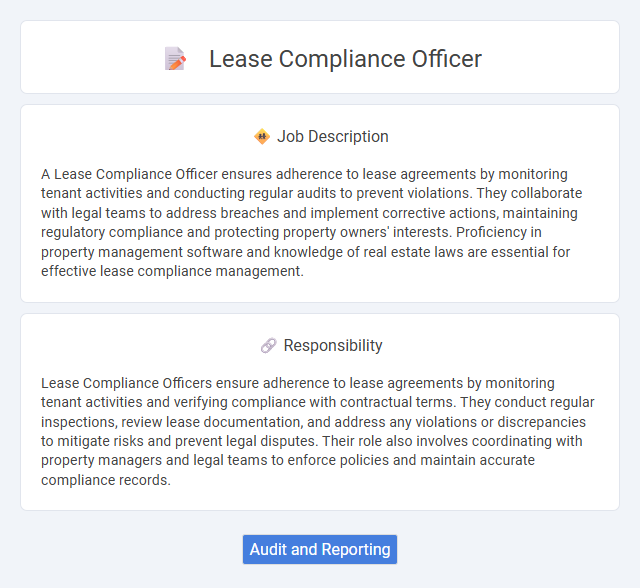
A Lease Compliance Officer ensures adherence to lease agreements by monitoring tenant activities and conducting regular audits to prevent violations. They collaborate with legal teams to address breaches and implement corrective actions, maintaining regulatory compliance and protecting property owners' interests. Proficiency in property management software and knowledge of real estate laws are essential for effective lease compliance management.
Individuals with strong attention to detail and excellent communication skills are likely to be suitable for a Lease Compliance Officer role, as the position often requires thorough review of lease agreements and enforcement of compliance standards. People who are comfortable working within legal and regulatory frameworks and capable of managing complex documentation may be better aligned with the responsibilities of this job. Those who prefer dynamic team collaboration and problem-solving under structured guidelines may find this role fitting, but candidates who struggle with meticulous record-keeping or interpreting contract terms might face challenges.
Qualification
Lease Compliance Officers must possess a strong understanding of property management laws, lease agreements, and regulatory requirements, typically requiring a bachelor's degree in real estate, business administration, or a related field. Professional certifications such as Certified Lease Auditor (CLA) or Certified Property Manager (CPM) enhance credibility and demonstrate expertise in lease compliance and auditing processes. Proven analytical skills, attention to detail, and experience with compliance software are essential qualifications to effectively monitor lease adherence and mitigate legal risks.
Responsibility
Lease Compliance Officers ensure adherence to lease agreements by monitoring tenant activities and verifying compliance with contractual terms. They conduct regular inspections, review lease documentation, and address any violations or discrepancies to mitigate risks and prevent legal disputes. Their role also involves coordinating with property managers and legal teams to enforce policies and maintain accurate compliance records.
Benefit
A Lease Compliance Officer likely ensures adherence to lease agreements, reducing the risk of costly legal disputes and penalties. Their oversight may improve tenant satisfaction and retention by maintaining clear communication and enforcing lease terms consistently. Companies employing these officers probably benefit from enhanced operational efficiency and minimized financial losses.
Challenge
The role of a Lease Compliance Officer likely involves navigating complex legal and regulatory frameworks to ensure adherence to lease agreements. Challenges may arise from the need to interpret ambiguous contract terms and address non-compliance issues promptly to mitigate financial risks. Effective communication and negotiation skills are probably essential to resolve disputes and maintain positive landlord-tenant relationships.
Career Advancement
A Lease Compliance Officer plays a crucial role in ensuring adherence to lease agreements and regulatory standards within real estate portfolios. Mastery of contract analysis, risk management, and property law paves the way for advancement to senior compliance roles or property management leadership. Gaining certifications such as Certified Property Manager (CPM) or Certified Lease Administrator (CLA) enhances career prospects and unlocks higher-level opportunities in real estate compliance sectors.
Key Terms
Audit and Reporting
Lease Compliance Officers ensure adherence to lease agreements through rigorous audit processes, identifying discrepancies in rental payments, maintenance obligations, and tenant obligations. They generate detailed compliance reports that provide actionable insights for property management, minimizing legal risks and enhancing lease enforcement. Proficiency in lease auditing software and real-time reporting tools is critical for maintaining accuracy and regulatory compliance.
 kuljobs.com
kuljobs.com